hankyoreh
Links to other country sites 다른 나라 사이트 링크
[Interview] Korea should prioritize raising quality of life over indiscriminate growth, argue economists
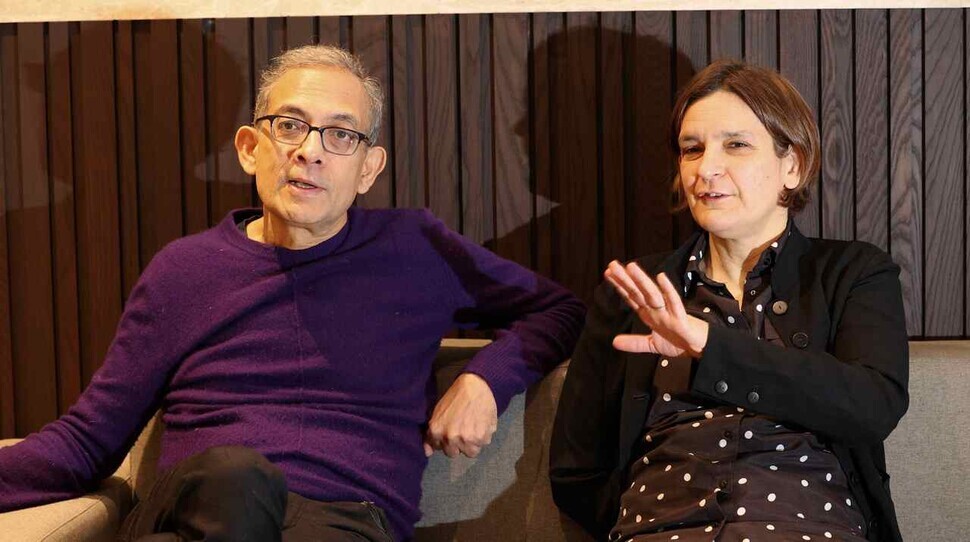
On Friday, the Hankyoreh sat down with MIT economics professors Esther Duflo and Abhijit Banerjee in Seoul’s Myeongdong area for an interview. The two were jointly awarded the Nobel Memorial Prize in Economic Sciences in 2019 for increasing humanity’s capacity to eradicate poverty across the globe.The couple was in Korea to participate in the Seoul International Forum on Safety Income.
Duflo advised that Korea not obsess over tax cuts, which have yet to be shown to have any efficacy, while Banerjee said that instead of prioritizing growth above all else, Korea should shift its economic objectives to raising the quality of life for its people.
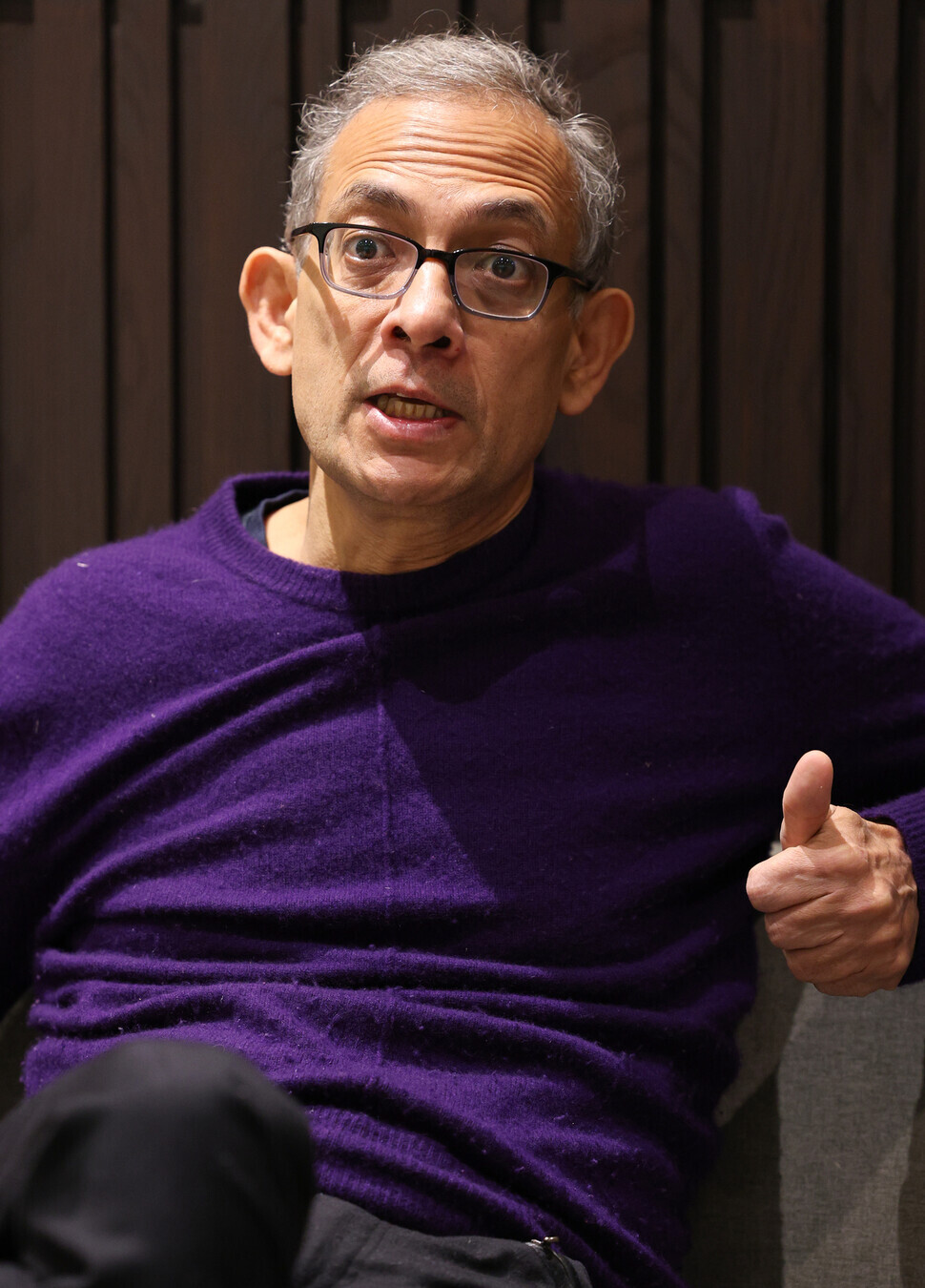
Hankyoreh: The tax burden ratio in Korea (tax revenue as a percentage of GDP) is around 20%, about half that of France. Since the conservative administration of Yoon Suk-yeol entered office, it has carried out a number of tax cuts, including reducing corporate tax burdens, a move that they say will encourage corporate investment and strengthen competitiveness. In this way, Arthur Laffer’s theory of taxation continues to hold sway in Korea, but do you see tax cuts as effective?
Esther Duflo: I don’t think anyone has shown that the Laffer curve existed in any policy at any time. It is one of those myths, like the Loch Ness monster. It would make sense not to be obsessed by it. We haven’t analyzed the Korean case, so I wouldn’t know what to expect by decreasing corporate tax rates in Korea. But the examples of the impact of tax cuts— things that have been studied in the US or elsewhere in Europe — don’t show partial or huge incentive effects.
The Laffer curve is an economic theory that posits that tax revenue eventually will begin to decline once taxes are raised past a certain point. The theory, put forth by University of Chicago professor Arthur Laffer, has been cited as the basis for many arguments for tax cuts. The curve is a representative example of what Duflo and Banerjee call “bad economics” — theory with no empirical basis backing it up. The Loch Ness monster is a supposed creature that lives in a lake in rural Scotland. While rumors and theories abound about “Nessie,” not once has her existence been confirmed.
Hankyoreh: Korea is obsessed with economic growth. Do you see this as a form of “bad economics”?
Abhijit Banerjee: First, yes. I think the obsession with growth seems entirely inappropriate. Growth has slowed, growth slows every minute. The first order fact about growth is that it slows. China is facing that, Korea is facing that. I think there’s enough wealth in Korea to make everybody able to live a reasonable life. Given that, we really need to think about effective redistribution, we need to think over what a good life is.
Part of the challenge in a good society like Korea’s is that because of the enormous pressure that people go through — school students, for example — they feel that somehow the world is about competition, that it’s about having to win against other countries. When in fact, most of the time, it’s not so much about winning against other countries, but it’s about having a quality of life. And the countries that embrace that, in a sense, have an easier transition to becoming high-income countries. It’s countries like Denmark, where the priority is much more on generating quality of life. I think you start taking in the pressure of “Are we succeeding? Are we failing?” Well, you have succeeded. Success is being a wealthy society. Let’s celebrate that success by being less stressed about more success. Korea at US$50,000, Korea at US$70,000 [per capita GNI] — it’s not clear that the quality of life could be improved. If children didn’t spend 18 hours a day studying and elderly people didn’t commit suicide, I think you would have a better society.
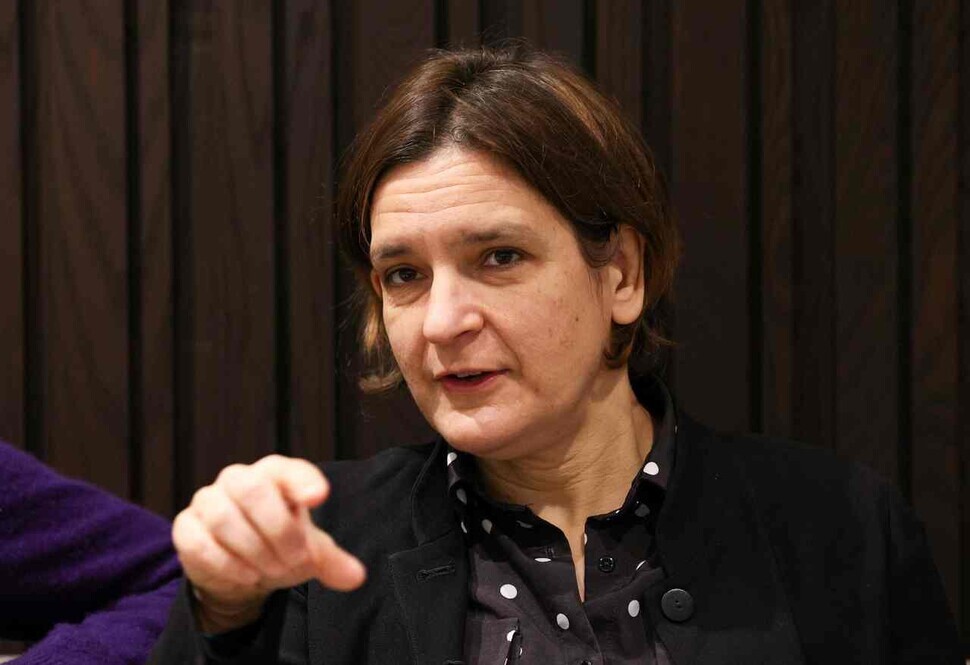
Hankyoreh: Korea has the lowest income redistribution effect from tax and fiscal policies in the OECD. The bureaucrats responsible for managing the economy often say that fiscal soundness is a priority and are very passive when it comes to using public policy to ameliorate inequality.
Duflo: Distribution is always very difficult, because people think that if there is distribution, they will be the one paying for everyone else. Surprisingly, when you look at people’s opinions on distribution, everyone seems to be against it, even the poor who benefit from it the most. Politically, it’s a very difficult topic, in every country.
All over the world, post-tax inequality is very strongly correlated with pre-tax inequality. So the fiscal distribution system is important for dealing with individual situations of poverty, et cetera. That said, it’s not where the big action on inequality is going to come from. The big action is going to come from the institutions that govern wage-setting and profit-sharing.
Korea is still much ahead of the US in terms of not having stratospheric revenue for the top 0.0001%. It’s very important to not reach that point, because once you get there, it’s very hard to get out of it. But in the US, it’s happened not just via the tax system, but also the development of unions and collective bargaining and the explosion of finance and [executives’] salaries. All of these things are very important to keep an eye on in terms of fixing inequality.
Hankyoreh: The dominant belief in many countries, including Korea, is that cash transfers create negative incentives to work. That’s why South Korea was spending the least on cash transfers during the pandemic. Policymakers believe these sorts of transfers make people more dependent on social products like welfare. Do you think that’s accurate?
Duflo: There is now quite a bit of evidence from all over the world — rich countries, poor countries — that this effect of receiving social transfer programs makes people less likely to work is not there. Of course, it might depend on people, it might differ by context and we don’t know exactly for Korea. But there is an experiment underway that will, I think, answer the question. There’s a new safety income project which is much more generous than the current national level policy. They just released the first year’s results a few days ago, but we are going to find out more in the years to come. Then policy can be adjusted as a consequence.
Banerjee: I agree. In fact, we have been working on this for many years on this exact question. The basic fact is that, at least in poorer countries, there’s no evidence that giving people cash transfers makes them work less. If anything, maybe in some places they work more. I want to say that this may be different for the elderly, because some of the elderly are working because they have no choice. But for most young people, people hate not having something to do.
Duflo: It would be very interesting if some of the elderly stopped working and took care of their grandchildren, liberating the moms to go work. That 5 to 7 window is so difficult for people to find child care. Yet the workday in Korea is the longest in the OECD.
The Seoul safety income project is an income security system that provides more financial assistance the less a household brings home, matching half of the difference between the median income and household income for low-income households. A total of 5,400 households (including 3,800 control households) are part of the pilot project in which the city provides support for two to three years to households that bring home less than 50% or 85% of the standard median Seoul income while having assets valued at less than 326 million won (around US$251,280).
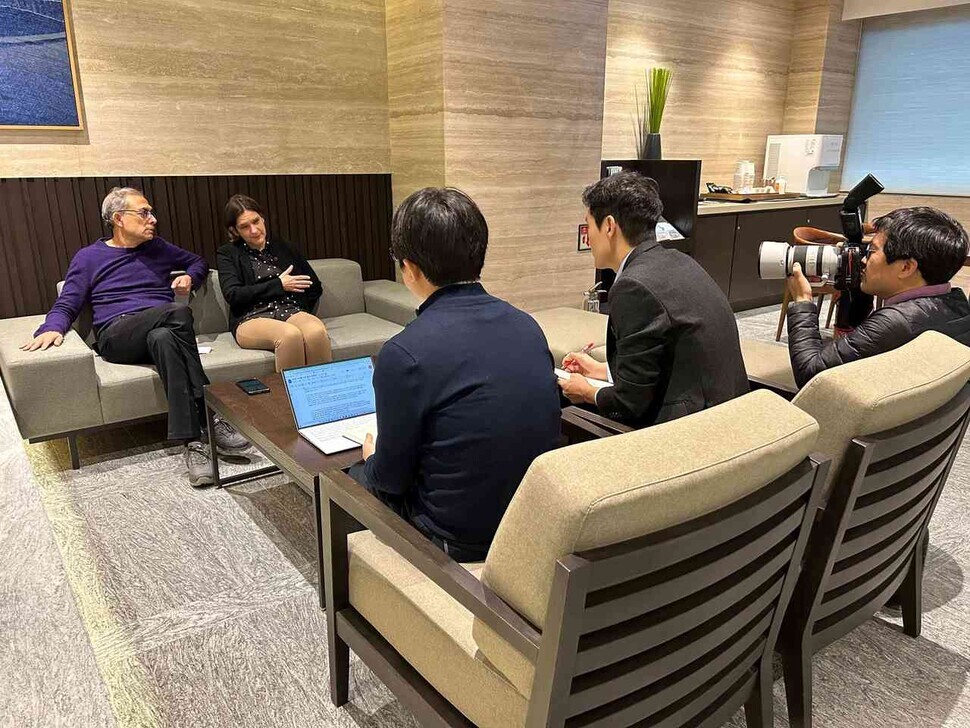
Hankyoreh: Part of the motivation behind that question is that the majority of bureaucrats in the government believe that there would be negative consequences to cash transfers.
Duflo: A majority of politicians have the same opinion. The majority of people, too. It’s interesting.
Banerjee: We actually did some work where we asked people if they were to get free cash transfers (A) will you stop working and (B) will other people stop working? And everybody says, “I’m never going to stop working. But everybody else will stop working.” They all believe that there will be a massive incentive effect. In fact, there’s no evidence for a massive incentive effect, so you get a particularly perverse situation in which people are against [the government] giving them money because they think that even though [they themselves] won’t stop working, other people will stop working. It’s crazy.
Hankyoreh: While Korea’s relative poverty rate of 15% is slightly lower than that of the US, the relative poverty of older people is 40% in Korea, the highest in the OECD. Korea is aging fast, but there have been insufficient policy efforts that go beyond simply waiting for pensions to mature.
Banerjee: That’s a feature of a country that grew very fast. In some sense, part of the problem is temporary. As the country grows slower, the [generation] gap will be smaller in the future. I imagine that, like in India, the assumption was that the children will take care of the parents, in which case the generational income gap doesn’t matter very much. But because there are fewer children, and so now instead of the assumption that a person will have three children and at least one will take care of them, maybe the person will have only had one child who may not.
Duflo: The solution for this generation has to be redistribution by the existing young, from the currently working people to the older people. It has to be a transfer that is over and above saving for their own retirement. It has to happen via the general government budget. A lot of the recipients of the Seoul “safety income” project [below 50%-80% median income] are actually elderly people. That’s a form of stopgap to the regular distribution system. And there’s no way around that. Korea is wealthy. It’s not that it cannot afford to do this. As long as there is social consensus around the question, I don’t see this as a particularly tricky question.
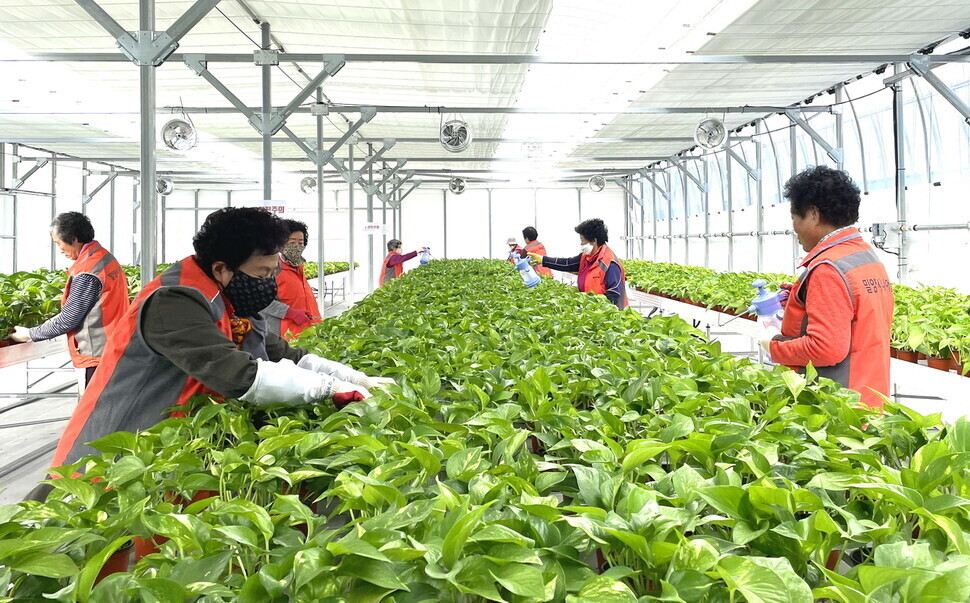
Hankyoreh: The employment rate of the elderly in Korea has grown rapidly and is around 36%, which is 10 points higher than that in Japan. While there’s a cultural aspect in which Koreans tend to think a person is lazy if they don’t work when they are fit enough to do so, do you think this could be attributed to the lack of a social safety net?
Banerjee: Can I say something that might sound harsh? Why not work? If you can, if the country is facing a labor shortage? I think it’s more that they should be given income supplements for working. It’s not a bad thing that the elderly work if they are able to work and if they are healthy enough. I don’t think that the fact that the elderly are working is a terrible thing, especially in a country where the demographic challenges are massive and the labor force is shrinking. There’s a sense in which one could make it a plus, one could turn it into a Korean experiment. You have to do it by not giving them the job of collecting trash or going out when it’s minus 15 degrees; you have to give them the right job.
Duflo: I would say something slightly different. When the current cohort of older people were born, Korea was poor, and probably a lot of them have been poor most of their lives. It’s likely that the 36% of the elderly who are working started working early and have been working quite a while. I agree with the question of “If you’re healthy enough, why not work?” Because one of the things that makes people really depressed around the world is when there is no sense that they are useful or they can contribute, nor the dignity that comes from that as well. But if you’re healthy enough is a big factor. Another thing is that Korea doesn’t have a great health care system or school system for older people. So my worry is that people shouldn’t be pushed into working, into continuing back-breaking, physical work that they’ve done all their lives, too long into their retirement.
This interview has been edited for length and clarity.
By Ryu Yi-geun, senior staff writer at the Hankyoreh Economy and Society Research Institute; Ro Young-joon, research assistant
Who are Esther Duflo and Abhijit Banerjee?
Esther Duflo is the second woman to receive the Nobel Memorial Prize in Economic Sciences and was selected as the 2010 John Bates Clark Medal for economists under 40. Abhijit Banerjee shared the Nobel with Duflo in 2019. The two married in 2015 and are currently both professors of economics at MIT and have made careers off of their empirical studies of poverty. They
have co-authored books including “Good Economics for Hard Times: Better Answers to Our Biggest Problems.”
Duflo and Banerjee are globally recognized and influential for their economic scholarship, both making it on Foreign Policy’s Top 100 Global Thinkers list.
Research and policies to break the cycle of poverty
Banerjee and Duflo are known for going beyond theory and taking action. The two founded the Abdul Latif Jameel Poverty Action Lab (J-PAL) at MIT in 2003 to ensure that policies for addressing poverty are informed by scientific evidence.
During the presentation speech by the Royal Swedish Academy of Sciences when the two economists were awarded the Nobel, their research was lauded for having “laid the foundation for a new approach which, in just 20 years, has transformed research on global poverty,” and having helped us “better understand the root causes of poverty, as well as to find effective ways of alleviating it.”
The methodology of randomized control trials was originally used in medical research, and involves dividing an eligible population into groups and comparing the effects of an intervention to a control group that does not receive the same intervention.
At one point in time, over 1.8 million people died each year from malaria, but this mortality rate plunged by 75% between 2005 and 2016. The widespread use of insecticide-treated bed nets (ITNs) played a big role in that decrease.
During a debate on whether ITNs should be distributed for free or sold, a randomized control trial showed that the distribution of free ITNs would be more effective in the war against malaria.
“Poor Economics,” a book co-authored by Duflo and Banerjee in 2011, is full of such empirical evidence, and has had a significant influence on policymakers.
They have approached the thought processes and behavior of the poor scientifically to research what approaches can break the cycle of poverty.
“Good Economics for Hard Times,” which they published three years ago, is the fruit of such labor.
Please direct questions or comments to [english@hani.co.kr]

Editorial・opinion
![[Column] Season 2 of special prosecutor probe may be coming to Korea soon [Column] Season 2 of special prosecutor probe may be coming to Korea soon](https://flexible.img.hani.co.kr/flexible/normal/500/300/imgdb/original/2024/0426/3317141030699447.jpg) [Column] Season 2 of special prosecutor probe may be coming to Korea soon
[Column] Season 2 of special prosecutor probe may be coming to Korea soon![[Column] Park Geun-hye déjà vu in Yoon Suk-yeol [Column] Park Geun-hye déjà vu in Yoon Suk-yeol](https://flexible.img.hani.co.kr/flexible/normal/500/300/imgdb/original/2024/0424/651713945113788.jpg) [Column] Park Geun-hye déjà vu in Yoon Suk-yeol
[Column] Park Geun-hye déjà vu in Yoon Suk-yeol- [Editorial] New weight of N. Korea’s nuclear threats makes dialogue all the more urgent
- [Guest essay] The real reason Korea’s new right wants to dub Rhee a founding father
- [Column] ‘Choson’: Is it time we start referring to N. Korea in its own terms?
- [Editorial] Japan’s rewriting of history with Korea has gone too far
- [Column] The president’s questionable capacity for dialogue
- [Column] Are chaebol firms just pizza pies for families to divvy up as they please?
- [Column] Has Korea, too, crossed the Rubicon on China?
- [Correspondent’s column] In Japan’s alliance with US, echoes of its past alliances with UK
Most viewed articles
- 1AI is catching up with humans at a ‘shocking’ rate
- 2Korea’s 1.3% growth in Q1 signals ‘textbook’ return to growth, says government
- 3[Column] Park Geun-hye déjà vu in Yoon Suk-yeol
- 4No good, very bad game for Korea puts it out of Olympics for first time since 1988
- 5[Column] Season 2 of special prosecutor probe may be coming to Korea soon
- 6[Column] Has Korea, too, crossed the Rubicon on China?
- 7Division commander ordered troops to enter raging flood waters before Marine died, survivor says
- 8Is Japan about to snatch control of Line messenger from Korea’s Naver?
- 9Marriages nosedived 40% over last 10 years in Korea, a factor in low birth rate
- 101 in 5 unwed Korean women want child-free life, study shows